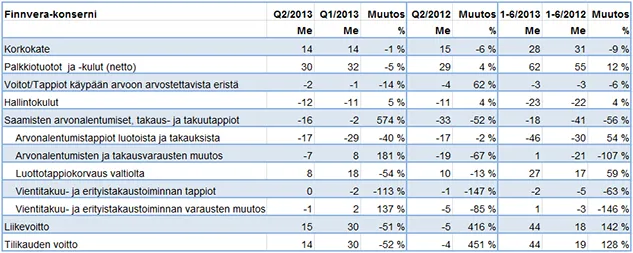The Finnvera Group’s Interim Report for January–June 2013

Demand for financing focused on small-scale projects and exports
When compared against the rest of Europe, financing has been available reasonably well in Finland, even though the price of financing and the requirements for collateral have risen. During the period under review, however, demand for Finnvera’s SME financing on the whole was slow. The financing needs of SMEs during the first half of the year were unusually low and continued to centre on working capital. The decline in Finland’s total exports did not affect the demand for export financing, which reached a higher level than in the year before.
Business operations and financial trend
The value of financing offers given to SMEs in January–June fell by 13 per cent when compared against the first half of 2012. During the first six months of 2013, applications for financing pertaining to exports increased on the previous year, but the offers given declined by 10 per cent because the credit agreements for some of the applications are still under negotiation.
The Finnvera Group’s profit was EUR 44 million, or clearly more than the profit for the first half of 2012 (19 million).The main factors improving the Group’s financial performance were the increase in the parent company’s fee and commission income and the decrease in net impairment loss on financial assets.
In the parent company, Finnvera plc, both export financing and SME financing showed a profit: The profit for export financing was EUR 39 million (28 million) and that for domestic credits and guarantees was EUR 8 million (-4 million). The subsidiaries and associated companies had an impact of EUR -2 million on the Group’s profit (-5 million).
The Group’s key figures on 30 June 2013 (30 June 2012)
- Capital adequacy 16.5 per cent (15.7)
- Cost/income ratio 29.5 per cent (29.5)
- Equity ratio 17.9 per cent (23.7).
Outlook for the Rest of the Year
An indication of the sluggish economy is that SMEs are reluctant to invest, and their demand for financing focuses on working capital. It is commonplace to rearrange financing and reschedule payments. Companies in the weakest economic position find it more difficult to acquire financing. As these companies are already vulnerable, they will have even fewer possibilities to pull through the difficult times.
It is expected that the demand for export credits and export credit guarantees during the second half of the year will remain at the same level as the year before. A major factor affecting the demand is the continuing uncertainty on the banking and financial markets. For this reason, it is increasingly common for buyers to expect a financing offer in connection with export transactions.
The uncertain economic trend makes it more difficult to predict Finnvera’s financial performance. However, according to the current estimate, the Finnvera Group’s financial performance for 2013 is predicted to improve on that for 2012, whereas in the Interim Report for January-March 2013, financial performance was expected to remain at the same level as in 2012.
CEO Pauli Heikkilä:
“The change in the State’s commitment to compensate for credit and guarantee losses will enable Finnvera to take greater risks in the financing of start-up enterprises and enterprises seeking growth and internationalisation. For its own part, Finnvera strives to ensure that SMEs with prerequisites for profitable business can arrange financing for their good projects. We are also looking for new financing models together with the Ministry of Employment and the Economy. For instance, we have investigated the possibilities of crowdfunding for SMEs. In this respect, decisions on Finnvera’s potential role will probably be made during the coming autumn.”
Additional information:
Pauli Heikkilä, CEO, tel. +358 29 460 2400
Ulla Hagman, Senior Vice President, Finances and IT, tel. +358 29 460 2458
